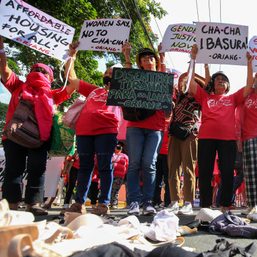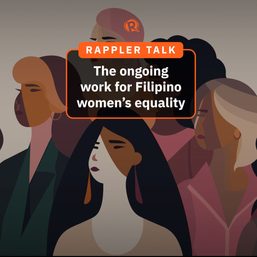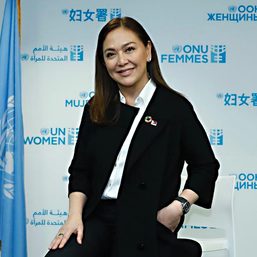SUMMARY
This is AI generated summarization, which may have errors. For context, always refer to the full article.
![[OPINION] Are women only ‘relievers’ in the political arena?](https://www.rappler.com/tachyon/2021/02/robredo-aquino-ispeak.jpg)
While our colonizers must indeed be blamed for the current gender structures in our society, it is necessary to note that there was already nuanced gender discrimination towards women even before they came. What our colonizers introduced was effortlessly embraced because, to begin with, there were already existing inequalities.
During the pre-colonial era, the commodification of women by being trafficked in marriage was a codified practice. Women did the majority of reproductive work. Furthermore, they could not participate in the political sphere (Eviota, 1992). We became susceptible to the system introduced to us by our colonizers because ours was already marred by inequalities.
To zero in on the flawed position of women during pre-colonial times, women would taken on the role of “relief worker” for men, or tagasalo in Filipino. Women would often be the second choice or the replacement for men for any relevant political or social function. It was customary that the husband served as the “primary” source of income for the family. However, in situations when he failed to fulfill that function, the burden was automatically passed on to the wife on top of her reproductive duties.
The same was true during the Spanish occupation. When men were taken to the mountains or far-flung lands to perform cash-crop work, it was the women who took on the role of heading the family.
In Philippine politics, we have seen two significant women whose careers were redefined by the demise of their spouses: former president Corazon Aquino and current Vice President Maria Leonor Robredo. These two women might not have planned on getting into politics (although they were already relatively active in civic affairs prior), but the abrupt deaths of their spouses seemed to have prompted them to assume these spouses’ political aspirations, as perceived by many. Their entry into politics may have been premeditated, but we cannot deny the fact that such an act was interpreted by the public as their way of continuing the punctuated careers of their husbands.
The public also saw these two women as still connected to their domestic life even if they had already been elected as national leaders. Many Filipinos ridiculed Aquino for being a homemaker who became president, while Robredo was tagged as “Leni Lugaw” by social media trolls. The public used these women’s domestic functions and their being women per se as a basis to discredit their leadership. Their track records had never been considered as a basis for their competence or lack thereof.
This phenomenon could be illuminated further by the triple role concept of women (Moser, 1993), which cites that among the 3 roles (productive, reproductive, community managing) of women, it is her community managing which is not fully recognized. Women’s leadership in the community is identified as a mere extension of their reproductive role.
This could be the reason why women are not taken seriously in politics unless they “boss up” to claim their authority. For instance, Alexandria Ocasio-Cortez, more popularly known as AOC, receives misogynistic remarks from her male colleagues because of her past career and the fact that she is a female politician in a man’s world. She is not criticized for her work, but for her being a female representative.
In President Rodrigo Duterte’s speech at the opening of the Skyway Stage 3 project, he said, in reference to his daughter Davao City Mayor Sara Duterte: “My daughter is not running. I have told Inday not to run kasi naaawa ako sa dadaanan niya na dinaanan ko. Hindi ito pambabae.” Duterte’s words directly spoke volumes about his belief that women could not handle the job of president of the Philippines.
Philippine politics is an arena that has been advanced and reformed by feminists, with the utilization of strategic and practical gender interests. Evidence of this is the passing of RA 7192 (Women in Development and Nation Building Act of 1992) which serves as the “legal basis for equal opportunity for women and men in political and civic life” (Hega and Evangelista 2017).
However, the furthering of strategic and practical gender interests in politics should be done more earnestly, as there were only 21.44% of women elected into public office in the 2016 elections. 30% is the ideal percentage necessary for women to make an impactful difference in our country’s decision-making, but we are almost 10% behind this number (PCW, 2020).
Women, against all odds, compensate for what men lack. In the end, whatever women supplement, they complete. They do not just augment, but they produce. They are not just an extension of society, but an independent agent in it. Women are not just pursuers of men’s unfulfilled dreams, but are dreamers themselves.
Women are not only “relievers” in the political arena, but they are also “deliverers,” as proven by the success stories of female leaders both past and present. The female leaders of Germany, New Zealand, Taiwan, Norway, Iceland, Finland, and Denmark have come up with effective measures against COVID-19. They have proven that women are reliable leaders during a crisis. They are capable of both being decisive and compassionate.
Women’s political advocacies and visions must be furthered by the Philippine government, most especially during this pandemic. – Rappler.com
Gaizel Arguelles Adan is an educator and women and children’s’ rights advocate.
Add a comment
How does this make you feel?





![[Free to disagree] How to be a cult leader or a demagogue president](https://www.rappler.com/tachyon/2024/04/TL-free-to-disagree.jpg?resize=257%2C257&crop_strategy=attention)
![[OPINION] Can Marcos survive a voters’ revolt in 2025?](https://www.rappler.com/tachyon/2024/04/tl-voters-revolt-04042024.jpg?resize=257%2C257&crop=251px%2C0px%2C720px%2C720px)
![[Edgewise] Quo vadis, Quiboloy?](https://www.rappler.com/tachyon/2024/03/quo-vadis-quiboloy-march-21-2024.jpg?resize=257%2C257&crop_strategy=attention)

![[OPINION] Sara Duterte: Will she do a Binay or a Robredo?](https://www.rappler.com/tachyon/2024/03/tl-sara-duterte-will-do-binay-or-robredo-March-15-2024.jpg?resize=257%2C257&crop_strategy=attention)


![[Dash of SAS] Making abortion a constitutional right](https://www.rappler.com/tachyon/2024/03/Its_true_-_Flickr_-_Josh_Parrish-1.jpg?resize=257%2C257&crop=125px%2C0px%2C768px%2C768px)
![[WATCH] Spoil me but respect me: A sugar baby’s story](https://www.rappler.com/tachyon/2024/03/titlecard-03.jpg?resize=257%2C257&crop_strategy=attention)

There are no comments yet. Add your comment to start the conversation.